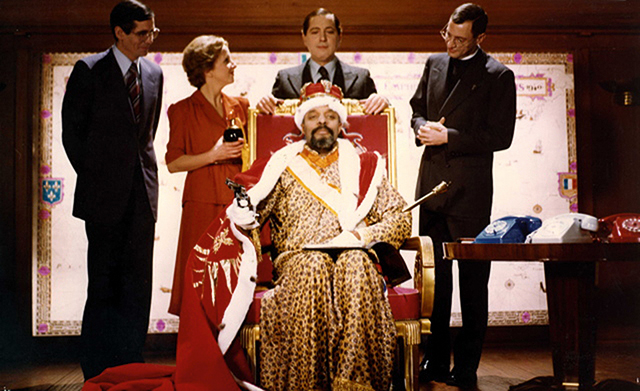
by Med Hondo (Abid Mohamed Medoun Hondo)
Originally published in ‘Framework’, Autumn 1979, as found on Jump Cut. Translation by Greg Kahn. Med Hondo’s ‘West Indies’ (1979) was shown as part of the ‘Across the Margins, Beyond the Pale’ program.
Throughout the world when people use the term cinema, they all refer more or less consciously to a single cinema, which for more than half a century has been created, produced, industrialized, programmed and then shown on the world’s screens: Euro-American cinema.
This cinema has gradually imposed itself on a set of dominated peoples. With no means of protecting their own cultures, these peoples have been systematically invaded by diverse, cleverly articulated, cinematographic products. The ideologies of these products never “represent” their personality, their collective or private way of life, their cultural codes, and never reflect even minimally on their specific “art,” way of thinking, or communicating — in a word, their own history and civilization. The images this cinema offers systematically exclude the African and the Arab.
It would be dangerous (and impossible) for us to reject this cinema simply as alien — the damage is done. We must get to know it, the better to analyze it. We’ll see that this cinema has never really concerned African and Arab peoples. This seems paradoxical, since it fills all the theaters and dominates the screens of all African and Arab cities and towns.
But do the masses have any other choice? “Consuming” at least a reflection of one’s own people’s life and history — past, present and future? LAWRENCE OF-ARABIA disseminates an image of Lawrence, not the Arabs. GENTLEMAN OF COCODY has a European as the gentleman hero, and not an Ivory Coast African. Do we have a single image of the experiences of our forefathers and the heroes of African and Arab history? Do we see a single film showing the new reality of cooperation, communication, support, and solidarity among Africans and Arabs?
This may seem exaggerated. Some critics will say that at least one African country, Egypt, produces some relatively important films each year and that since independence a number of cineastes have made a future for themselves in African countries. Yet, in the whole continent of Africa, Egypt is only one country, one cultural source, one sector of the market. Few African countries buy Egyptian films and they themselves produce too few films. Furthermore, the market within Egypt itself is still dominated by foreign films.
African and Arab filmmakers have decided to produce their own films. But despite the films’ undoubted quality, they have no chance of being distributed normally, at home or in the dominant countries, except in marginalized circuits — the dead-end art cinemas.
Even a few dozen more filmmakers would only achieve a ratio of one to ten thousand films. An everyday creative dynamic is necessary. We need to make a radical change in the relation between the dominant Euro-American production and distribution networks and African and Arab production and distribution, which we must control. Only in a spirit of creative and stimulating competition among African and Arab filmmakers, can we make artistic progress and become “competitive” on the world market. We must first control our own markets, satisfy our own people’s desires to liberate their screens, and then establish respectful relations with other peoples, and balanced exchange.
WE MUST CHANGE THE HUMILIATING RELATION BETWEEN DOMINATING AND DOMINATED, BETWEEN MASTERS AND SLAVES.
Some critics flee this catastrophic state of affairs, thinking cinema is restricted for Western, Christian and capitalist elites or they throw a cloak of fraternal paternalism over our filmmakers, ignoring and discrediting our works, blaming us, in the short term forcing us to a formal and ethical “mimesis” — to imitate precisely those cinemas we denounce — in order to become known and be admitted into international cinema; in the end, forcing us into submission, renouncing our own lives, creativity and militancy.
Since our independence many of our filmmakers have proved their abilities as auteurs. They encounter increasing difficulties in surviving and continuing to work, because their films are seldom distributed and no aid is available. Due to the total lack of a global cultural policy, African and Arab cinema becomes relegated to an exotic and episodic sub-product, limited to aesthetic reviews at festivals, which, although not negligible, are insufficient.
Multinational film companies earn 50% of their profits from Third World screens. Each year millions of dollars are “harvested” from our continents, taken back to the original countries, and then used to produce new films which again come to our screens.
Thus, each of our countries unknowingly contributes a lot of money to the production of films in Paris, New York, London, Rome or Hong Kong. We have no control over them and reap no financial or moral benefit, being involved in neither production nor distribution. In reality, however, we are coerced into being “co-producers” while our resources are plundered. The United States allows less than 13% foreign films to enter its market — and most of these are produced by European subsidiaries controlled by the U.S. majors, which exercise an absolute protectionism.
Film plays a major role in building peoples’ consciousness. Cinema is the mechanism par excellence for penetrating the minds of our peoples, influencing their everyday social behavior, directing them, and diverting them from their historic national responsibilities. It imposes alien and insidious models and references, and without apparent constraint encourages our people to adopt modes of behavior and communication based on the dominant ideologies. This damages our own cultural development and blocks true communication between Africans and Arabs, brothers and friends who have been historically united for thousands of years.
This alienation disseminated through the image becomes all the more dangerous for being insidious, uncontroversial, “accepted,” and seemingly inoffensive and neutral. It needs no armed forces and no permanent educational program from those who seek to maintain the division between African and Arab peoples — our weakness, submission, servitude, and ignorance of each other and of our own history. We forget our positive heritage, united through our foremothers with all humanity. Above all we have no say in the progress of world history.
Dominant imperialism seeks to prevent portraying African and Arab values to other nations. Were they to appreciate our values and behavior they might respond positively to us. They believe themselves “superior” to us, to our peoples’ roles in world history. We are not proposing isolation, closing our frontiers to all Western film, nor any protectionism separating us from the rest of the world. We wish to survive, develop, and participate as sovereign peoples in our own specific cultural fields and to fulfill our responsibilities in a world from which we are now excluded.
The night of colonialism caused many quarrels among us. We have yet to assess the full consequences. It poisoned our potential communications with other peoples since we have been forced into relations of colonial domination. We often have preconceived and false ideas of each other imprinted by racism. Having been colonized and then subjected to even more pernicious imperialist domination, we are not entirely responsible for this state of affairs. Yet some intellectuals, writers, filmmakers, thinkers, and our cultural leaders and policy-makers are also responsible for perpetuating this insatiable domination. It has never been enough simply to denounce our domination, for the imperialists dictate the rules of the game to their own advantage.
Some African and Arab filmmakers realize that the cinema alone cannot change our disadvantaged position, but they know that it is the best means of education and information and thus of solidarity. We must organize our forces, reassert our different creative potentialities, and fill the void in our national, regional and continental cinemas. We must establish cultural relations of communication and cooperation between our peoples in a spirit of equality, dignity and justice. We have the will, means and talent to undertake this great enterprise.
Without organizing our resources, we cannot flourish at home. Dozens of African and Arab intellectuals, filmmakers, technicians, writers, journalists and leaders have had to leave our own countries, often despite ourselves and end up contributing to the development and overdevelopment of countries that don’t need us, and that use their excesses to dominate us.
This will continue until we grasp the crucial importance of cultural and economic strategy and create our own networks of film production and distribution, liberating ourselves from all foreign monopolies.
